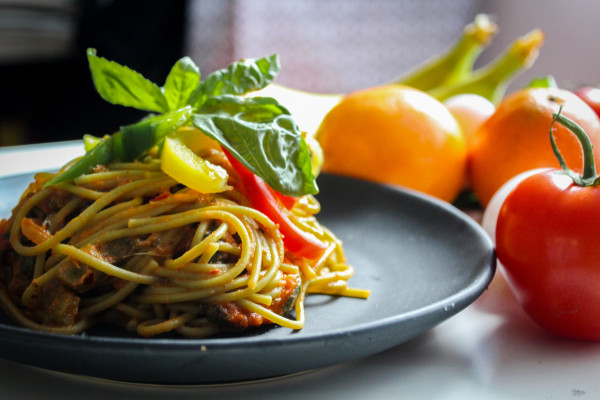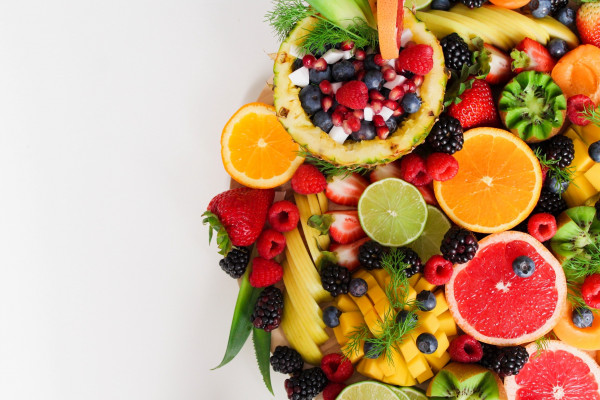Foods to eat when you’re pregnant

Eat a variety of healthy foods every day - fruit and vegetables, breads and cereals (especially wholegrain), milk and milk products (preferably reduced- or low-fat), and lean meat, chicken, seafood, eggs, legumes (like peas, beans, lentils, chickpeas, and soybeans), nuts and seeds.
Fruit and vegetables
Vegetables and fruit provide carbohydrates (sugar and starch), fibre, vitamins and minerals, and they’re low in fat.
You can eat plenty of fruit and vegetables in pregnancy, whether fresh (and well-washed), frozen, or canned. It’s good to aim for around four servings of vegetables and two servings of fruit each day.
It’s a good idea to limit fruit juices and dried fruit, because these are high in sugar.
Breads and cereals
Cereals and bread provide carbohydrates (sugar and starch), fibre, and nutrients such as B vitamins and minerals.
You can eat plenty of breads and cereals when you’re pregnant, including pasta, rice, breakfast cereals, bread, and other grain products. It’s a good idea to choose wholegrain varieties because they provide extra nutrients and fibre – and they help prevent constipation.
Aim for around six servings of breads and cereals each day – this could be made up of, for example, one cup of cornflakes, one slice of toasted bread, one muffin, one cup of cooked pasta, and two bread rolls.
Milk and milk products
Milk and milk products are a great source of protein, vitamins and minerals – especially calcium and iodine – for pregnant women.
Aim for at least three servings of milk or milk products. It’s a good idea to choose reduced- or low-fat products.
Talk to your midwife if you don’t drink milk or milk products. If you choose to have nut or grain-based bread, for example, you could choose one that’s fortified with calcium and other nutrients.
Lean meat, chicken, seafood, eggs, legumes, nuts and seeds
These foods give you protein, iron, zinc and other nutrients. Your body needs more iron and zinc when you’re pregnant. Iron is especially important to avoid anaemia (iron deficiency).
Iron-rich foods include red meat, chicken, fish, green leafy vegetables, beans, peas, pumpkin and kumara, and grains like oatmeal and whole grain breads. The iron in plant-based foods isn’t as easily absorbed, so you’ll need to eat a larger amount of those foods in each meal.
Your body can only absorb a small amount of iron at one time, so it’s important to eat iron-rich foods every day. Vitamin C helps your body absorb iron, so serve iron-rich foods with foods rich in vitamin C like broccoli, cooked taro leaves, oranges, kiwifruit).
Drinking milk products and tea products can reduce absorption of iron from meals, so try to space these out from iron inclusive meals.
Be careful when buying, preparing, cooking and storing food to make sure it’s safe to eat.
Plant-based diets during pregnancy
A vegan (plant-based) diet can meet your nutritional requirements during pregnancy, as long you eat a wide selection of kai/foods from all the right food groups. As with any pregnant woman you may need to supplement with key nutrients. It would be good to do this in consultation with your LMC (lead maternity carer).
The below pamphlet from the Vegan Society of New Zealand shows how you can ensure a healthy, balanced diet during pregnancy while following Ministry of Health Guidelines.
Read more about food safety
Eating well in pregnancy makes you feel better, and it’s important for your baby’s development. Benefits of good nutrition in pregnancy include:
- reducing your risk of anemia (iron deficiency)
- reducing unpleasant pregnancy symptoms like nausea and tiredness
- helping you have a healthy pregnancy weight gain and lowering your risk of gestational diabetes
- providing your baby with a great nutritional start to life
- a healthy birth weight for your baby
- good foetal brain development
- a reduced risk of birth defects.
Cravings, nausea, and indigestion can make it hard to eat the right foods all the time – try to eat the right foods most of the time.
You can’t always get everything you and your baby need from food. Find out about folic acid and iodine tablets and how to get enough vitamin D.
What to drink when you’re pregnant
Aim for nine cups of fluid each day. Water, reduced-fat or low-fat milk is best.
It's safest not to drink alcohol when you're pregnant.
It’s a good idea to limit your caffeine intake when you’re pregnant, and be careful of herbal teas – some are not recommended for pregnant women and should have a label saying that.
Drinks like soft drinks, flavoured waters, fruit drinks, cordial and diet drinks are low in nutrients and can be high in sugar, so it’s better to limit these.
Avoid drinking tea with meals. The tannins in tea mean you won't absorb the iron in the meal as well as you could.
Foods to avoid when you’re pregnant
When you’re pregnant your immunity is lower, so you and your unborn baby are more at risk than usual from food-borne illnesses.
Bacteria like listeria, salmonella and campylobacter and pathogens like toxoplasma can cause food-borne illness.
When you’re pregnant, this can cause infection in you and your baby, and in extreme cases can result in miscarriage or stillbirth.
For that reason, it’s advised that you don’t eat any of the following foods while you’re pregnant:
- processed meats* - pâté, salami, ham and luncheon, for example
- cold pre-cooked meat* - chicken (plain or smoked) and corned beef, for example
- raw (unpasteurised) milk and raw milk products
- soft pasteurised cheese* (brie, camembert, feta, blue, mozzarella and ricotta)
- pre-prepared or unrefrigerated salads, including rice or pasta salad, coleslaw, roasted vegetable and green salads
- hummus and other dips containing tahini such as baba ghanoush and halva
- raw, smoked* or pre-cooked fish* or seafood*, including sushi, smoked salmon, marinated mussels or oysters
- foods containing raw egg - smoothies, mayonnaise, hollandaise sauce or desserts like mousse, for example
- soft-serve ice cream
- cream or custard, especially in pre-made cakes or pastries (unless home-made or pre-packaged and eaten within two days of opening).
*Note that these foods are safe to eat if heated thoroughly until piping hot, that is, above 70°C.
Eating to help manage morning sickness

Nausea and vomiting are often the first sign you’re pregnant. Even though it’s commonly called morning sickness, it can happen any time of the day or night, especially when you’re hungry or tired.
The good news is that early in pregnancy you don’t need much additional nutrition, so it’s rare for nausea and vomiting to cause any nutritional problems. But if your vomiting is severe, and you struggle to keep any foods or liquid down, it’s a good idea to seek advice from your midwife or doctor.
Try:
- eating regularly, choosing smaller meals or snacks
- having fewer high-fat and spicy foods
- a carbohydrate snack (a slice of dry toast, a cracker or fruit) before getting out of bed in the morning
- drinking small sips of flat lemonade or ginger ale
- ginger or foods flavoured with ginger
- giving yourself extra time in the morning - rushing can make you feel worse
- to rest more.
If cooking smells make you feel sick, have someone else do the cooking while you’re not in the room.
Eating to help manage indigestion and heartburn
It’s common to suffer from indigestion and heartburn towards the end of pregnancy.
Try:
- eating regularly, choosing smaller meals or snacks
- having fewer high-fat and spicy foods
- avoiding drinking fluids with meals
- avoiding lying down straight after a meal - going for a walk may help
- raising the head of the bed or using extra pillows.
Check with your midwife or doctor before taking antacids.
Managing cravings
Cravings can be a normal part of pregnancy. It’s common to crave fatty, sugary and salty foods, but eating too many of these foods can lead to excess weight gain – and they can mean you eat fewer healthier foods.
If you’re craving fatty, salty, or sugary foods, try instead:
- chewing sugarless gum
- having a hot drink
- distracting yourself
- having healthy snacks on hand
- switching your craving for something to a healthier alternative, eg having a hot chocolate instead of a chocolate bar.
It’s a good idea to have small, regular healthy meals and snacks, and keep drinking fluids (water is best). Your family and whānau can support you by preparing meals.
When you’re pregnant, talk to your midwife or doctor about the right amount of weight to gain during pregnancy. This is different for each person.